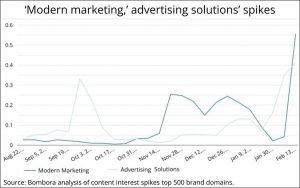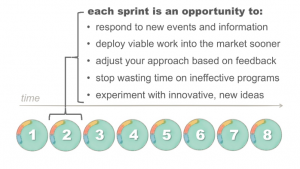— March 29, 2019
Lead scoring – as a fundamental part of a company’s lead management strategy – has officially fallen out of fashion. I say this based, anecdotally, on the number of B2B marketers I talk to who either 1) don’t use lead scoring at all, or 2) have a lead scoring system that clearly doesn’t work (or is completely ignored by the sales team) and have no apparent motivation to fix it.

How did we get here? Two reasons I can think of:
One is that lead scoring is routinely set up as part of an initial implementation of a marketing automation platform. That initial set-up is typically basic at best, usually as part of an overall “rush to value” and an impatience to get the system live. The result, inevitably, is a lead scoring model that fails to take into account the complexity of the company’s selling process. When salespeople see inaccurate lead scores, they rapidly lose trust in the system, and ignore the data from that point forward. Marketing, in turn, sees no reason to fix the system because “sales doesn’t use lead scoring.”
The second reason has to do with the trend towards Account-Based Marketing (ABM). The classic business case for lead scoring has been a function of inbound marketing and the traditional lead funnel. Companies generate a mix of qualified and unqualified leads, the argument goes, and lead scoring is one tool for helping to sort the good from the bad. The move to a more account-based model shifts the emphasis from individual leads to accounts, and also lessens the need to score leads because (in theory, if not in practice) leads are more qualified in general due to the company only marketing to accounts that fit their target profile.
So, is lead scoring a dying art? Something that simply isn’t worth the investment in today’s account-based marketing world? I would argue: no. An effective, accurate, trusted lead scoring model is a vital cog in a company’s overall lead management process. And as long as most companies adopt a hybrid model that combines traditional, funnel-based demand generation with ABM (a scenario that industry experts indicate is the case), spending the time to make lead scoring work is an investment very much worth making.
Here are 3 key reasons why lead scoring is still relevant:
Increased Sales Productivity – effective lead scoring helps sales (and especially BDR teams) focus their time and energy on leads that merit attention, avoiding leads that aren’t worth the effort. By applying objective standards, and optimizing those standards over time, lead scoring helps eliminate “missed” leads that would otherwise be ignored by sales, and capturing revenue that might otherwise fall through the cracks.
Faster Lead Velocity – if reps know more about the leads assigned to them, they’re able to have more meaningful conversations and make their outreach more relevant, and effective. More effective outreach means higher rates of engagement. Higher engagement means more leads move through the funnel, more quickly. Faster lead velocity means shorter sales cycles.
More Insightful Reporting – many companies in enterprise markets have sales cycles that are too long to make ROI (or even pipeline attribution) a practical way to measure demand generation effectiveness, at least not in a manner that allows for rapid optimization. Lead scoring enables a more detailed view of the lead lifecycle, and, in turn, better visibility into the types of activities and programs that are generating qualified leads.
Photo by Nick Hillier on Unsplash
Business & Finance Articles on Business 2 Community
(22)







